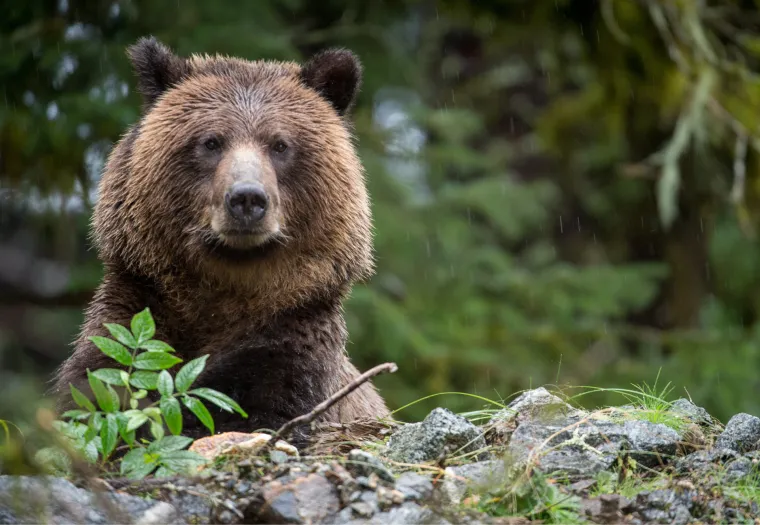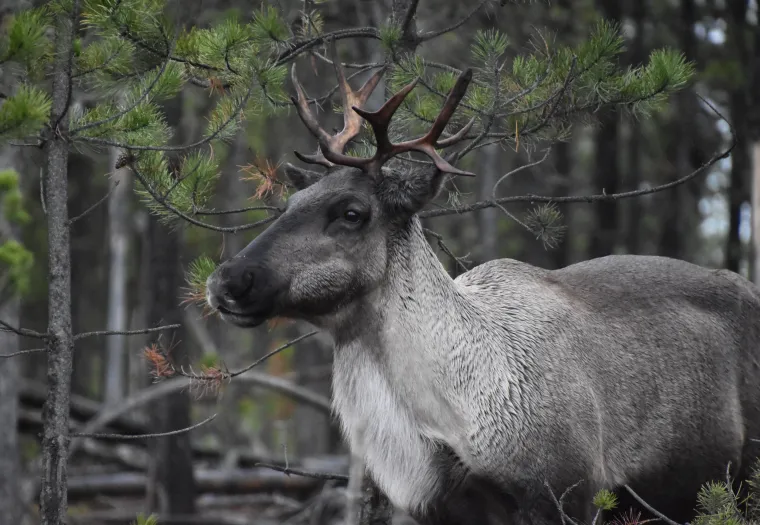
Species of Interest
Wildlife and Fish
Supporting Species of Interest
Our industry professionals implement a range of measures to minimize environmental impact. These include mapping animal habitats to ensure their protection; timing, planning, harvesting and planting activities during the parts of the year when they cause the least disruptions; and engaging and working with local experts, Indigenous communities and stakeholder groups to refine our plans.
Under ecosystem-based forest management principles, we manage for all animal, fish and plant biodiversity. However, we recognize that the public has special interests in specific species, including grizzly, caribou and aquatic habitats.

There are grizzly bears in most of our managed forests in B.C. and Alberta. In Alberta, the grizzly bear is designated as threatened. In British Columbia, the grizzly bear is blue-listed, meaning populations are considered sensitive or vulnerable.
Roads used to access these harvest areas are connected to increased human-wildlife interaction and therefore increased risk for grizzly bears. We continue to work on access management plans with governments, stakeholders and other partner organizations and on integrated operational planning with other industry users to manage our road footprint.
We actively support research to ensure grizzly bears remain a prominent feature of the forest landscape. This includes our role as a founding member of the Grizzly Bear Research Program managed by fRI Research. The program—which began in 1998—conducts cutting-edge research and ongoing monitoring work. In its decades of operation, it has used science to provide knowledge and planning tools to ensure the long-term conservation of grizzly bears, contributing to the success of the species in Alberta.

West Fraser is committed to collaborative efforts to recover caribou populations. For decades, we’ve worked collaboratively to contribute to the stabilization and recovery of caribou populations in partnership with the provincial governments of B.C. and Alberta, as well as with the Government of Canada.
We manage operations in a manner that supports the provincial recovery efforts and applies the best available science and information. Within our ecosystem-based forest management approach, our habitat experts and wildlife biologists study caribou habitat in our operating areas. We consider the potential impacts of harvesting activity and implement practices to support the maintenance of productive caribou habitat.
West Fraser also supports innovative research to provide science-based approaches and evidence-based strategies to inform our forestry practices. West Fraser is a founding partner in the Alberta Regional Caribou Knowledge Partnership (ARCKP) alongside other forestry companies and the Government of Alberta. The ARCKP is a forestry-focused research group that provides practical knowledge and tools so that, through targeted conservation and restoration, we can improve our operations to benefit caribou.

At West Fraser, we acknowledge the important role that streams, lakes, wetlands and other waterbodies play in supporting the biodiversity of our forested landscapes.
In B.C. and Alberta, we operate in regions where fish species like rainbow trout, westslope cutthroat trout and bull trout are experiencing population declines. To support the health and connectivity of fish species with their habitats, we are guided by our provincial and federal regulations but also work collaboratively as a member of initiatives such as Alberta’s Watercourse Crossing Program and the Foothills Stream Crossing Partnership. Through these programs, we work with regulators and watercourse crossing owners to identify and prioritize habitat improvement opportunities and work with other stakeholders taking a targeted regional approach to habitat remediation.
West Fraser actively seeks opportunities to support research and collaboration that contributes to the continual improvement of knowledge around species recovery, threats and management best practices.